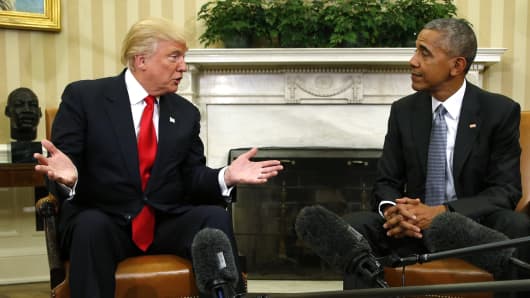
If the world was in a state of suspense leading up to the American election, then things have gotten much worse since Donald Trump’s victory and investiture as president of the United States on Friday.
“America First,” the idea being advanced by the United States’ new president, which explicitly references defending America’s proud past – including in its relations with the rest of world – stands in contrast to Obama’s eight years in office as well as the time of his predecessors. Only now, since the changeover from Obama to Trump, is it possible to sense the shift – or rather, the collapse – that has taken place.
Turning to the new president, the difficulties now facing Trump are born of his country’s interior, the place where his campaign first began. In an era in which everything has been globalized, it’s yet to be seen how the new president will work out a policy of economic protectionism that doesn’t also harm those businesses that have already relocated outside of the United States to reduce production costs, maximize profits and avoid expenditures.
It will be interesting to follow America’s path under Trump: Expectations [for what his presidency will bring] have remained even as Trump began to enact the first of his measures, bringing an end to “Obamacare,” which had expanded insurance coverage to millions of Americans. The White House’s new resident has shown that he will, in fact, make good on his promises and that no one will be able to stop him. As for what is happening right now, the surge of violence generated by the multimillionaire’s rise to power is more a reflection of the defeat of both the Democrats and Hillary Clinton than a worsening or deepening of the weaknesses and irregularities that plague the American democratic system. The free world’s leading country is being shown to be less perfect than how it was seen in the past. Now, it’s the time of Trump.
Barack Obama’s own efforts were in vain: Obama himself had observed that the majority of Americans would never vote on the basis of threats or for fear of reprisals; all the same, the U.S. political system’s weaknesses have come to the surface. The great successes of the Obama era, which enchanted the naiveté of the world, were demolished by Trump in a matter of minutes. These successes had rested on the rhetoric and theatrics vaunted by the modern political left, something that also happens in Europe, while, in the end, failing to transform anything. Not even Obama’s last phrase on the White House website – “Yes, we did. Yes, we can!” – provides any hope for a return to the White House of “Obama’s America,” not least because the 22nd Amendment of the U.S. Constitution, ratified in 1951, prevents him from seeking a third term. Immediately afterward, Trump responded, exclaiming, “We’re going to make America great again!”
The severity of Trump’s speech, almost revolutionary-like, was frightening. So, too, was the palpable nervousness in the air during his swearing-in. But at no time did I hear the new president make a declaration of war against any foreign country.
Over the course of the election, it became evident that private interests were holding the U.S. electoral system hostage. It was made even clearer that, in the end, justice and transparency are not guaranteed elements of the electoral process. After all, it’s the Electoral College – whose decision is separate from the will of the people – that determines the vote: While Democratic candidate Hillary Clinton had three million more votes than her opponent, an amount sufficient to be declared the winner, the Electoral College still gave the electoral victory to Trump. The vote is not being respected. Hillary’s defeat, despite winning the popular vote, was an embarrassment for democracy at a global level.
Electoral fraud is a scandal; yet, during his eight years in office, Obama never once made any attempt to alter this faulty electoral system – just like he never did anything for Africa, which naïvely placed great hope in him. African women, whom Obama came to defend through his complimentary statements, thank him for it, yet they remain the primary targets of discrimination in America.
While it’s still too early to assess what Trump’s America will be like, the fact that Trump has singled out the Islamic State and its extremism as the country’s only external military threat – something that no one with good sense can deny – while also prioritizing the economy at a time when it’s become fashionable to meddle haphazardly in unrelated issues, is a good sign.
Meanwhile, Portugal is preparing to interfere to a massive extent in the general elections to be held this year in Angola. Enlisting the help of the old colonists, supporters of apartheid, the international finance sector, fake journalists, television channels and ragtag revolutionaries, a diabolical plan is underway. Perhaps it wouldn’t be a bad idea to follow the example set out by Trump and [recall] the lessons of the past. Let the Angolan people be the ones to decide their own destiny!

Leave a Reply
You must be logged in to post a comment.